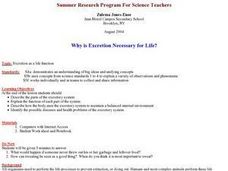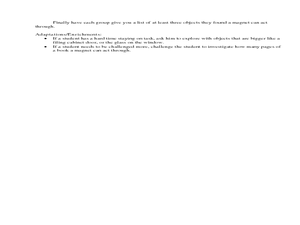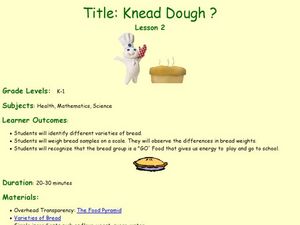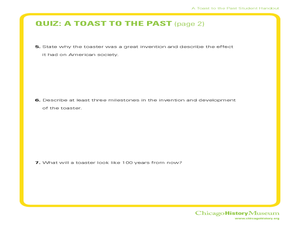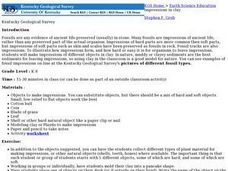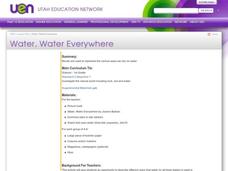Curated OER
Why is Excretion Necessary for Life?
Students describe and explain the function of each part of the excretory system. They discuss how the body uses the excretory system and identify diseases of the system.
Curated OER
The Great Kapok Tree Debate
Young scholars participate in a read aloud of the story, "The Great Kapok Tree" in which a logger decides not to cut down a tree. In small groups, they discuss and write about their opinion on the logger's decision. Each group then...
Curated OER
Radioactivity
In this radioactivity worksheet, students write the mass number and atomic number for the missing element in the reactions. Students identify the isotope that is more stable and determine the half-life of the isotope. This worksheet has...
Curated OER
Chucky Chickadee
Students create an original project dealing with birds. In this bird instructional activity, students take a virtual field trip to bird feeders around the nation. Students replicate the coloring of winter birds.
Curated OER
Whose Skeleton is in Your Closet?
Students analyze and measure parts of a model skeleton to determine sex, race, height and age. They produce a lab report from their inquiries.
Curated OER
PLANETS IN PROPORTION
Middle schoolers discover scales for both the solar bodies' relative sizes and their distances from the sun. They find equatorial circumference and volumes of their solar bodies. Students apply estimation strategies and proportioanl...
Curated OER
Teaching About Magnets in Kindergarten
Students explore magnets through the five lessons of this unit. The everyday uses of magnets and an awareness of magnetic attraction form the basis of the skills presented in these lessons.
Curated OER
Measuring Elapsed Time
Fifth graders convert units within the same measurement system and be able to determine elapsed time. They are given a start time and an end time of a game. Students determine the amount of elapsed time from the data that is given.
Curated OER
Crossing Polluted Waters
High schoolers investigate the different concepts involved in crossing a body of water that is polluted through a simulation that is supposed to be done without a boat. The goal of the lesson is for groups to role play after creating a...
Curated OER
Exploring Magnets
Second graders experiment with magnets. In this magnet lesson, 2nd graders attach a magnet to several different objects to see what it sticks to. They place objects in between a magnet and metal to see if the magnetic force still works.
Curated OER
The Next Logical Step in Astronomy
Young scholars research future astronomy endeavors and how the exploration with contribute to astronomy and humanity. In this astronomy lesson plan, students research, present, and debate the topics as a class.
Curated OER
Clouds: Cumulus, Cirrus, and Stratus
Students, after listening to The Cloud Book, by Tomie dePaola, explore cumulus, stratus, and cirrus clouds. They identify and draw an example of each type of cloud.
Curated OER
All About Me: My Senses
Students explore the world around them and identify their five senses and the parts of their bodies that are associated with each sense.
Curated OER
Spring Nature Walk
Students go on a nature walk and look for specific plants and animals. They check off items they find and determine if they were a plant or an animal.
Curated OER
Bubonic Plague
Learners study the history of the causes and spread of the Bubonic Plague. They determine what groups of people were affected by the disease and locate the geographic areas they resided in. Working in small groups they conduct a an...
Curated OER
Knead Dough?
Students make bread and understand that bread gives us energy. For this bread lesson plan, students read the story A Trip to the Market, and learn about the importance of bread. Then they make the bread!
Utah LessonPlans
Water, Water Everywhere
Murals are used to represent the various ways we rely on water.
Curated OER
A Toast To The Past
Students analyze, and research the identity of the non electric toaster as a historical artifact. In this toaster lesson plan, students then create a visual timeline of toaster history.
Curated OER
Biotechnology in Agriculture: Non-surgical removal of fertilized embryos from the Bovine Uterus
Students simulate the step-by-step procedures needed to non-surgically remove embryos from the uterus of a superovulated cow using the Kalver training cow.
Curated OER
Impressions in Clay
Students examine how fossils are created. They make impressions of different objects in clay and compare them to examples of fossils.
Curated OER
Electricity 5
Fifth graders demonstrate their understanding of circuits by working in small groups to create a flashlight using a limited number of supplies.
Curated OER
Water, Water Everywhere
First graders study water-its properties, its 3 states, and the way we rely on it for everyday living. They read Water, Water Everywhere, draw murals of where they have seen water and the ways they use it and eat/drink snacks that are...
Curated OER
Mountain Building
Teacher prepares four layers of Plasticine stacking layers on top of each other to create a model of how rocks within the earth can be folded creating anticlines and synclines below the surface and mountains and valleys on the surface.
Curated OER
Blend-A-Plant Levels of Organization
Students' identify and analyze the levels of organization and the emergent properties through experimentation. Students' apply the differences in the properties of a plant before and after it has been subjected to a kitchen blender.


